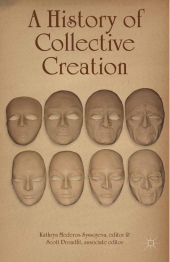 Neuerscheinungen 2013Stand: 2020-01-07 |
Schnellsuche
ISBN/Stichwort/Autor
|
Herderstra▀e 10
10625 Berlin
Tel.: 030 315 714 16
Fax 030 315 714 14
info@buchspektrum.de |

S. Proudfit, Kathryn Mederos Syssoyeva
(Beteiligte)
A History of Collective Creation
Herausgegeben von Proudfit, S.
1st ed. 2013. 2013. ix, 274 S. 229 mm
Verlag/Jahr: SPRINGER PALGRAVE MACMILLAN; PALGRAVE MACMILLAN US 2013
ISBN: 1-349-46134-2 (1349461342)
Neue ISBN: 978-1-349-46134-9 (9781349461349)
Preis und Lieferzeit: Bitte klicken
Collective creation - the practice of collaboratively devising works of performance - rose to prominence not simply as a performance making method, but as an institutional model. By examining theatre practices in Europe and North America, this book explores collective creation┤s roots in the theatrical experiments of the early twentieth century.
Introduction: Toward a New History of Collective Creation; Kathryn Mederos Syssoyeva PART I: THE FIRST WAVE 1. From Monastic Cell to Communist Cell: Groups, Communes, and Collectives, 1900-1945; Kathryn Mederos Syssoyeva 2. Revolution in the Theatre I: Meyerhold, Stanislavsky, and Collective Creation - Russia, 1905; Kathryn Mederos Syssoyeva 3. Reduta┤s Reorigination of Theatre: Radical Collectivity in Poland┤s Interwar Theatre Laboratory; Kris Salata 4. The Accidental Rebirth of Collective Creation: Jacques Copeau, Michel Saint-Denis, Leon Chancerel, and Improvised Theatre; Jane Baldwin 5. Collective Creation in Documentary Theatre; Attilio Favorini PART II: THE SECOND WAVE 6. Crossroads and Confluence: Collective Creation, 1945-1985; Scott Proudfit and Kathryn Mederos Syssoyeva 7. Collective Creation as a Theatre of Immanence: Deleuze and The Living Theatre; Laura Cull 8. Something Queer at the Heart of It: Collaboration Between John Cage and Merce Cunningham; Michael Hunter 9. Shared Space and Shared Pages: Collective Creation for Edward Albee and the Playwrights of the Open Theater; Scott Proudfit 10. Against Efficiency: The Theatre du Soleil┤s Experimental Relations of Production; David Calder 11. From Mao to the Feeling Circle: The Limits and Endurance of Collective Creation; Victoria Lewis 12. Who┤s in Charge?: The Collective Nature of Early Chicano Theatre; Jorge A. Huerta 13. Collective Creation in Quebec: Function and Impact; Jean-Marc Larrue
"The editors and contributors perform admirably at providing fresh content and context to an ever-evolving tradition and practice, thus exposing the creative tension between experimentation and performative exploits. Gems include Laura Cull┤s use of Deleuze philosophy to posit an ontological approach to reveal creative forces behind the Living Theatre and distinguished scholar and director Jorge Huerta┤s piece on Chicano contributions (e.g., El Teatro Campesino) . . . Summing Up: Recommended. Graduate students, researchers, faculty." - CHOICE
"A History of Collective Creation, a groundbreaking historical narrative traces central modernist and postmodern European and North American theatrical movements that have altered and advanced the theoretical foundations of collective and alternative theatre practice. Dr. Kathryn Syssoyeva┤s lucid historical sensibility together with the scholarly essays included herein, re-explores the historical geneses and critical language that made it possible for these new theatrical voices to revolutionize transnational, collective performativity in an heterogeneous manner." - Roberto D. Pomo, California State University, USA, and co-author of The Longman Anthology of World Drama and Theatre: A Global Perspective
"The essays . . . do provide some fascinating discussions of both lesser-known and fairly famous practitioners who have devised their performances collectively, from the early twentieth century to the present." - Theatre
"A History of Collective Creation addresses an important need in the study of collective creation, devised theatre, and improvisational theatre by illuminating the fact that these methods of theatre-making are not limited to the latter half of the last century." Sean P. Holmes, Theatre Research International


